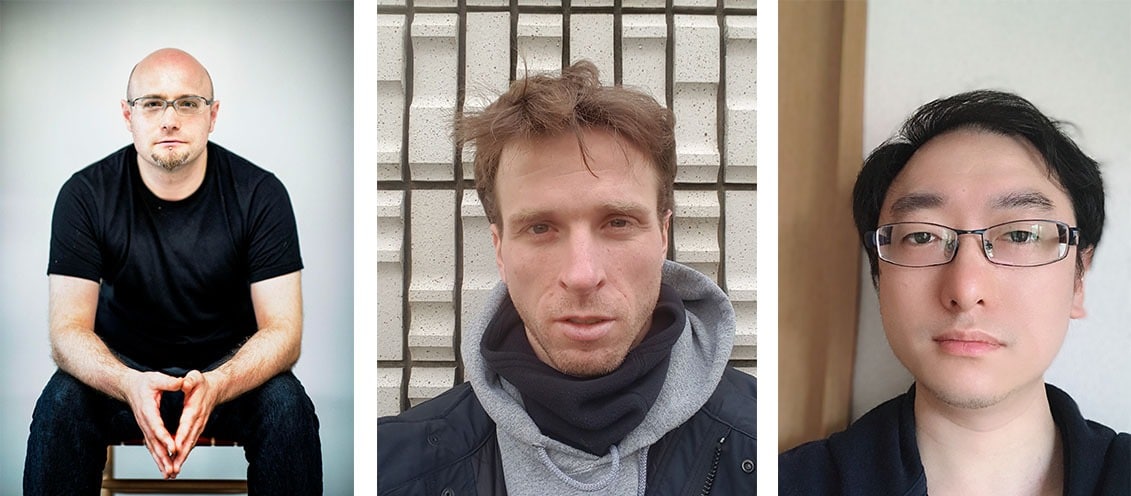
(Research team L-R: Nathaniel Virgo – ELSI, Martin Biehl – Araya, and Acer Chang – Araya.)
Summary
- Research company Araya, based in Japan, has received a grant from GoodAI in order to carry out AI research into multi-agent systems from the perspective of information geometry. The research will be led by Research Scientist Dr. Martin Biehl.
- The researchers aim to use modern mathematical methods to investigate how multiple agents with multiple goals interact when trying to achieve those goals. The interactions include all forms of communication, competition, cooperation, and coordination. Their framework should improve understanding of when and how multiple agents form a group that can again be seen as an agent with a goal.
- These insights will help analyze whether multi-agent learning in the inner loop (i.e. during the agent’s lifetime, without retraining) is advantageous as an approach to building advanced intelligent agents.
Current artificial intelligence is limited in its scope and is far from human-level intelligence. One of the key components missing is learning to pursue multiple goals, ones that are dynamic, changing, and that depend on knowledge acquired from previous tasks. Solving this problem is the topic of a new project by Japanese research company Araya, the project is funded through a grant by international research and development company GoodAI.
The work, which will be led by Research Scientist Dr. Martin Biehl will produce a new framework for multi-agent AI systems that aims to advance the field of multi-agent learning and inform the development of GoodAI’s own artificial intelligence framework, Badger architecture. It will do so by both increasing our understanding of existing algorithms and how they can be applied and by the development of novel methods.
The grant is part of the ongoing GoodAI Grants initiative, which has awarded over $600,000 so far. The initiative is supporting research groups across the world that are solving problems related to GoodAI’s Badger architecture. The vision is that each research grant, along with the work of the GoodAI research team, will contribute in some way to basic AI research, and all together fill in some of the gaps in the roadmap to advanced, increasingly human-like AI.
The project led by Dr. Martin Biehl will focus on four areas where current artificial intelligence methods fall short:
- The ability to have multiple, often competing goals
- Coordination and communication from an information-theoretic perspective
- Dynamic scalability of multi-agent systems
- Dynamically changing goals that depend on knowledge acquired through observations
Dr. Biehl said: “Using modern mathematical methods we will investigate ways in which multiple agents with multiple goals interact when trying to achieve those goals. This includes all forms of communication, competition, cooperation, and coordination.
Our insights will help in designing multi-agent systems like the inner loop of the Badger architecture which involves setting up these features so that they result in a capable system as a whole. More generally, our research will result in a better understanding of when and how multiple agents form a group that can again be seen as an agent with a goal. Together with my collaborators Nathaniel Virgo from the Earth-Life Science Institute at Tokyo Institute of Technology and Acer Chang from Araya we are looking forward to working on this exciting project.”
Marek Rosa CEO and CTO of GoodAI said: “I am very happy to award this grant to the team at Araya, we have been collaborating in the past for example on our General AI Challenge and see that their work is extremely related to our Badger architecture and will help us understand the math behind it better. I look forward to progressing this project which continues to push the boundaries of modern technology.”
About Araya
Founded in 2013, Araya has provided AI solutions in various industries, including the manufacturing business. For example, its Deep Learning solutions are being applied in autonomous vehicles. Also, Araya is developing Autonomous AI, which allows robots or drones to perform their tasks without human teaching. Furthermore, Araya aims to develop the next generation of AI technology by reinterpreting the results of consciousness research in neuroscience, information theory, and other fields.
Collaborate with us
If you are interested in Badger Architecture and the work GoodAI does and would like to collaborate, check out our GoodAI Grants opportunities or our Jobs page for open positions!
For the latest from our blog sign up for our newsletter.





